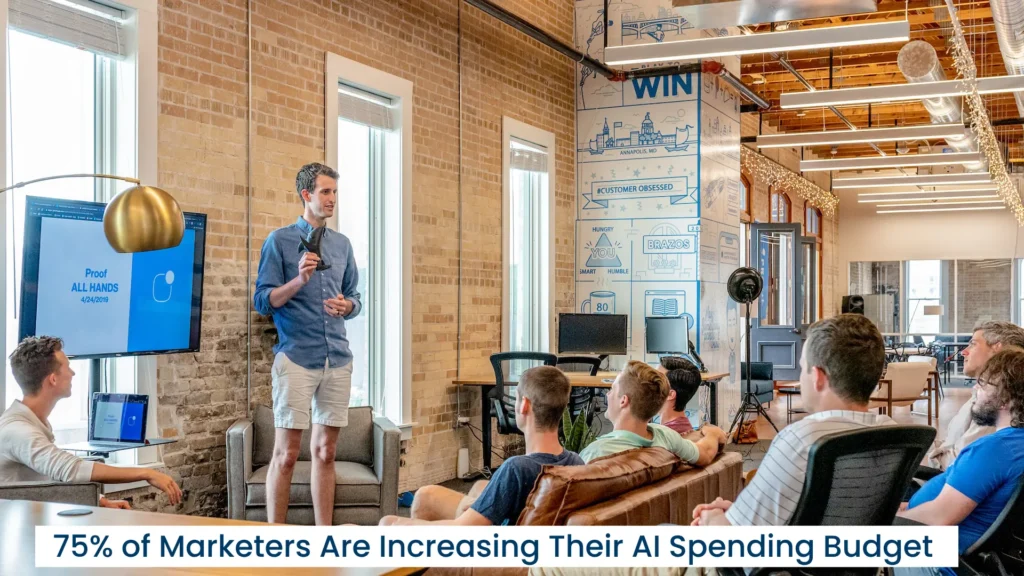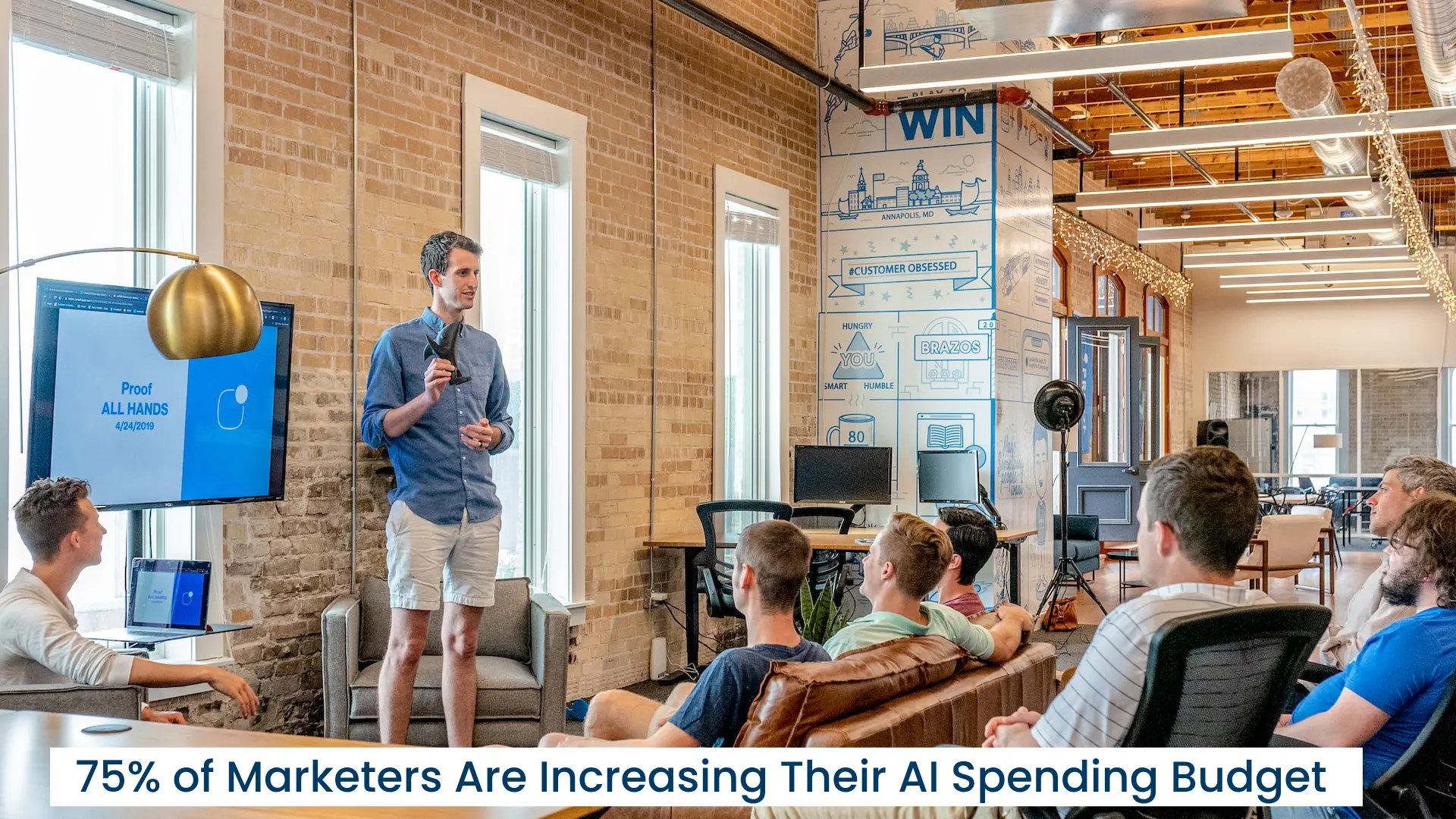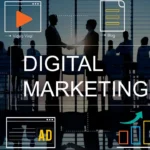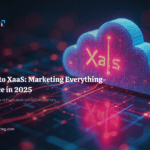Office No. 608, Lunkad Sky Station, Viman Nagar Road, Pune, Maharashtra 411014, India
Phone: +1 213-261-0597
contact@techthinkmarketing.com
Why AI in Marketing is becoming increasingly important.
AI Spending Budget Artificial Intelligence (AI) has emerged as a transformative force in the field of marketing, reshaping strategies, campaigns, and customer interactions. In recent years, its importance has surged, with 75% of marketers reporting a substantial increase in their AI spending, averaging a remarkable 28% boost. This dynamic shift underscores the critical role AI plays in modern marketing.

AI Spending Budget AI in marketing refers to the utilization of advanced machine learning algorithms, data analysis, and automation to enhance various aspects of marketing initiatives. It empowers marketers to make data-driven decisions, personalize customer experiences, optimize ad targeting, and improve overall campaign efficiency. Here’s why AI has become increasingly indispensable in the marketing landscape:
- Data-Driven Insights: AI can process vast amounts of data at lightning speed, providing marketers with invaluable insights. It allows businesses to understand customer behavior, preferences, and trends, helping them tailor marketing efforts for maximum impact.
- Personalization: In an era where consumers demand highly personalized experiences, AI enables marketers to create individualized content and recommendations. This level of personalization not only enhances customer satisfaction but also boosts conversion rates.
- Predictive Analytics: AI-powered predictive analytics can forecast future trends, customer behaviors, and market dynamics. This foresight empowers marketers to proactively adjust their strategies and stay ahead of the competition.
- Efficiency and Automation: Marketing tasks that were once time-consuming and manual, such as email marketing, content curation, and ad optimization, can now be automated with AI. This streamlines workflows, reduces human error, and frees up marketers to focus on strategic planning.
- Improved Customer Service: Chatbots and virtual assistants powered by AI provide real-time support to customers, answering queries and resolving issues 24/7. This enhances customer satisfaction and builds brand loyalty.
- Cost Savings: AI can optimize ad spend by identifying the most effective channels and audiences. Marketers can allocate resources more efficiently, reducing wastage and increasing ROI.
- Competitive Advantage: As more businesses adopt AI in their marketing strategies, staying ahead of the curve becomes essential. Those who harness AI effectively gain a competitive advantage by offering superior customer experiences and more targeted campaigns.
- Scale and Scalability: AI allows businesses to scale their marketing efforts rapidly without proportional increases in human resources. This scalability is particularly valuable for startups and businesses looking to expand quickly.
Table of Contents
Toggle75% of marketers are increasing their AI spending.
AI Spending Budget 75% of B2B marketing managers reported increased AI marketing spending from last year.”
AI Spending Budget This statistic reveals a noteworthy trend in the world of B2B marketing. Specifically:
- Increased AI Adoption: The fact that 75% of B2B AI Spending Budget marketing managers reported increased spending on AI demonstrates a substantial shift towards adopting artificial intelligence in marketing strategies. This increase suggests that more businesses are recognizing the potential of AI to improve various aspects of their marketing efforts.
- Growing Importance of AI: The AI Spending Budget rise in AI spending underscores the growing importance of AI technologies in the marketing landscape. Businesses are allocating more resources to leverage AI-driven solutions for tasks such as data analysis, campaign optimization, and audience targeting.
- Competitive Advantage: AI Spending Budget Companies that are increasing their AI marketing spending are likely doing so to gain a competitive advantage. AI can provide a significant edge by enabling personalized marketing, data-driven decision-making, and the ability to adapt quickly to changing market conditions.
- Effectiveness of AI: AI Spending Budget The statistic also suggests that these B2B marketing managers have experienced positive results from their AI investments. They are likely seeing improved campaign performance, better audience engagement, and increased ROI, which incentivizes them to allocate more budget to AI initiatives.
- Market Research and Content Ideation: AI Spending Budget The information provided also highlights specific use cases for AI in marketing, such as content ideation, data collection, ad optimization, and market research. These are areas where AI can excel in automating tasks, providing insights, and enhancing decision-making.
- Impact on Workforce: It’s worth noting that nearly 25% of respondents are reducing staff as a result of AI adoption. This suggests that AI is not only reshaping marketing strategies but also impacting the workforce by automating certain roles and tasks.
- Improved Targeting: A majority (59%) of the managers believe that using AI is the most effective tactic for reaching target audiences. This demonstrates AI’s capability to analyze data and deliver highly targeted and relevant content to the right audience segments.
AI Spending Budget In summary, the statistic reveals that AI is not just a buzzword but a concrete investment area for B2B marketers. The increased spending AI Spending Budget on AI reflects its growing importance as a strategic tool for improving marketing campaigns, enhancing efficiency, and staying competitive in an ever-evolving digital landscape. Businesses are recognizing the value AI can bring to their marketing efforts and are willing to allocate more budget to harness its potential.

What this means for Marketers and how they can use AI to improve their marketing campaigns.
AI Spending Budget The fact that 75% of B2B marketing managers reported increased AI marketing spending signifies a significant shift in how marketers perceive and utilize AI in their campaigns. Here’s what this trend means for marketers and how they can harness AI to enhance their marketing efforts:
- Enhanced Personalization: AI enables marketers to create highly personalized experiences for their target audiences. Marketers can use AI to analyze customer data and behavior, segment their audience more effectively, and deliver tailored content, product recommendations, and offers. This results in higher engagement and conversion rates.
- Data-Driven Decision-Making: AI can process and analyze large volumes of data rapidly, providing valuable insights into customer preferences, trends, and market dynamics. Marketers can use AI-powered analytics to make data-driven decisions, optimize marketing strategies, and allocate resources more efficiently.
- Improved Targeting: AI can refine audience targeting by identifying the most relevant demographics and segments. It helps marketers deliver the right message to the right people at the right time, reducing ad spend wastage and improving ROI.
- Automation of Repetitive Tasks: Marketers can use AI to automate time-consuming and repetitive tasks such as email marketing, content curation, and social media posting. This frees up marketing teams to focus on strategic planning and creativity.
- Predictive Analytics: AI-powered predictive analytics can forecast future trends and customer behaviors. Marketers can use this insight to proactively adjust their strategies, launch campaigns at optimal times, and stay ahead of competitors.
- Chatbots and Customer Support: AI-driven chatbots and virtual assistants can provide 24/7 customer support, answering queries and resolving issues instantly. This enhances customer satisfaction and ensures a positive brand experience.
- Content Creation and Optimization: AI can assist in content ideation, creation, and optimization. It can analyze data to identify content topics that resonate with the target audience and even generate written content, saving time and resources.
- Ad Campaign Optimization: AI can optimize digital advertising campaigns by adjusting bidding strategies, ad creatives, and targeting parameters in real-time. This results in more cost-effective ad spend and improved campaign performance.
- Market Research: AI can analyze vast amounts of market data, consumer reviews, and social media sentiment to provide valuable market research insights. Marketers can use this information to identify emerging trends and adapt their strategies accordingly.
- Competitive Advantage: Marketers who effectively leverage AI gain a competitive advantage by offering superior customer experiences, optimizing campaigns faster, and staying ahead of industry trends.
AI Spending Budget To harness the power of AI in marketing campaigns, marketers should:
- Invest in AI Tools: Explore AI marketing platforms and tools that align with your specific goals and budget.
- Collect and Analyze Data: Ensure you have robust data collection processes in place, and use AI to analyze this data for insights.
- Experiment and Learn: AI technologies are evolving rapidly. Marketers should be willing to experiment with new AI-powered solutions and adapt their strategies as they learn.
- Stay Ethical and Transparent: When using AI for personalization and targeting, prioritize ethical data usage and be transparent with customers about data collection and usage practices.
In summary, AI Spending Budget the increased adoption of AI in marketing presents a wealth of opportunities for marketers to improve campaign performance, enhance customer experiences, and gain a competitive edge. By leveraging AI technologies effectively and ethically, marketers can unlock the full potential of AI in their marketing efforts.
Ways in Which AI is being used in Marketing
AI Spending Budget AI is being used in marketing across various functions and strategies to enhance efficiency, deliver better customer experiences, and drive results. Here are some different ways AI is employed in marketing:
- Personalizing Content and Experiences:
- Content Recommendations: AI algorithms analyze user behavior and preferences to suggest relevant content, products, or services. For example, Netflix uses AI to recommend movies and TV shows to subscribers.
- Email Personalization: AI-powered email marketing tools can tailor email content, subject lines, and send times based on individual recipient preferences and behavior.
- Website Personalization: AI-driven personalization engines can modify website content, product recommendations, and offers in real-time based on visitor behavior.
- Automating Tasks:
- Chatbots and Virtual Assistants: AI-driven chatbots provide instant responses to customer inquiries, handle routine tasks, and improve customer support efficiency.
- Social Media Management: AI can automate social media posting, monitor brand mentions, and analyze social media engagement to optimize content strategy.
- Content Generation: AI tools can assist in generating written content, such as news articles, product descriptions, and blog posts, saving time for content creators.
- Analyzing Data:
- Data Analytics: AI algorithms process large datasets to uncover insights, trends, and patterns. Marketers can use AI-powered analytics to gain a deeper understanding of customer behavior and market dynamics.
- Sentiment Analysis: AI can analyze social media comments, reviews, and customer feedback to determine sentiment and identify areas for improvement.
- Customer Segmentation: AI can automatically segment customers based on various attributes and behaviors, enabling more targeted marketing campaigns.
- Predicting Customer Behavior:
- Predictive Analytics: AI-powered predictive models forecast future customer behaviors, such as purchase intent, churn likelihood, and lifetime value. Marketers can use these predictions to tailor strategies.
- Lead Scoring: AI can rank leads based on their likelihood to convert, allowing sales teams to prioritize high-potential prospects.
- Dynamic Pricing: AI algorithms adjust pricing based on demand, competitor pricing, and historical data to optimize revenue.
- Content Optimization:
- A/B Testing: AI can automate A/B testing of different content elements, such as headlines, images, and calls to action, to determine which variations perform best.
- SEO Optimization: AI tools help marketers identify keyword opportunities, optimize content for search engines, and track search engine ranking changes.
- Ad Campaign Optimization:
- Ad Targeting: AI analyzes user data to identify the most relevant audiences for ad campaigns. Platforms like Google Ads and Facebook Ads use AI to improve ad targeting.
- Ad Creatives: AI can generate or optimize ad creatives, making them more appealing and relevant to the target audience.
- Bid Management: AI adjusts bidding strategies in real-time to maximize ad spend efficiency and achieve campaign goals.
- Customer Journey Mapping:
- Path Analysis: AI analyzes customer journeys across various touchpoints to identify the most common paths and bottlenecks in the customer journey.
- Recommendation Engines: AI can suggest next steps or products in the customer journey based on previous interactions and behavior.
- Fraud Detection and Prevention:
- Payment Fraud Detection: AI algorithms can identify potentially fraudulent transactions, reducing chargebacks and financial losses.
- Ad Fraud Prevention: AI tools can detect and prevent fraudulent clicks and impressions in digital advertising.
AI Spending Budget These are just some of the many ways AI is transforming marketing. As AI technologies continue to advance, marketers will have even more opportunities to streamline operations, enhance customer experiences, and drive better results in an increasingly data-driven and competitive landscape.
How marketers have used AI to achieve success – Case Studies
- Netflix: Personalizing Content RecommendationsObjective: AI Spending Budget Netflix wanted to improve user engagement by providing personalized content recommendations to its subscribers.AI Solution: Netflix developed a recommendation algorithm called the Netflix Recommendation Engine, which uses machine learning to analyze user viewing history, preferences, and behaviors. It then suggests movies and TV shows tailored to each user.Results: Netflix’s recommendation engine has played a significant role in retaining and engaging subscribers. It’s estimated that the majority of content watched on Netflix comes from these personalized recommendations, contributing to their impressive subscriber growth and market dominance.
- Sephora: Augmented Reality (AR) Beauty Try-OnObjective: Sephora sought to enhance the online shopping experience for beauty enthusiasts by allowing customers to virtually try on makeup products.AI Solution: Sephora developed an AR-powered mobile app that uses facial recognition and AI to enable customers to visualize how different makeup products would look on their faces. The app also provides personalized product recommendations.Results: Sephora’s AR try-on feature led to increased user engagement and customer satisfaction. It not only helped customers make more informed purchase decisions but also drove higher conversion rates and online sales.
- IBM Watson: Content Marketing and Lead GenerationObjective: IBM wanted to improve its content marketing strategy by creating highly relevant and personalized content for its audience.AI Solution: IBM used IBM Watson’s AI capabilities to analyze customer data, identify content topics of interest, and predict which content formats would perform best. They also employed chatbots to engage website visitors and capture lead information.Results: IBM saw a significant improvement in content engagement and lead generation. By tailoring content to individual preferences and using chatbots for personalized interactions, they achieved a 90% increase in click-through rates and a 75% reduction in customer response times.
- MGM Resorts International: Predictive Analytics for Customer BehaviorObjective: MGM Resorts wanted to optimize its marketing efforts by predicting customer behaviors and preferences to deliver more targeted promotions and offers.AI Solution: They implemented a predictive analytics system that utilized AI and machine learning to analyze customer data, including past behaviors, preferences, and booking history. This allowed them to anticipate guests’ needs and tailor marketing campaigns accordingly.Results: MGM Resorts achieved a 20% increase in customer engagement and a 12% increase in revenue per customer. By understanding and catering to individual preferences, they enhanced the overall guest experience and loyalty.
- Adobe Sensei: Email Marketing OptimizationObjective: Adobe sought to improve the effectiveness of its email marketing campaigns by delivering more personalized content to subscribers.AI Solution: Adobe integrated Adobe Sensei, its AI and machine learning platform, to analyze customer data and create dynamic email content. The AI system adjusted email content in real-time based on user behavior and preferences.Results: Adobe experienced a 50% increase in email click-through rates and a 35% increase in email-generated revenue. By leveraging AI to deliver more relevant content, they enhanced user engagement and achieved higher conversion rates.
These case studies highlight the diverse ways in which AI is empowering marketers to achieve their objectives, from personalizing recommendations to optimizing content and improving customer engagement. AI continues to revolutionize the marketing landscape by enabling data-driven, customer-centric strategies that deliver tangible results.
Benefits of using AI in Marketing
Using AI in marketing offers a wide range of benefits, transforming how businesses engage with their audience and manage their marketing efforts. Here are some key advantages of incorporating AI into marketing strategies:
- Increased Efficiency:
- Automation of Repetitive Tasks: AI can automate time-consuming and repetitive marketing tasks, such as email marketing, content curation, and data analysis. This frees up marketers to focus on strategic planning and creative endeavors.
- Real-time Optimization: AI algorithms can adjust ad campaigns, content delivery, and targeting in real-time based on data analysis. This ensures that marketing efforts are always optimized for maximum impact.
- Improved ROI (Return on Investment):
- Data-Driven Decision-Making: AI provides in-depth data analysis and insights, helping marketers make informed decisions about their campaigns and budget allocation. This leads to more effective spending and improved ROI.
- Predictive Analytics: AI can forecast customer behaviors and market trends, allowing businesses to proactively adjust their strategies to capitalize on opportunities and mitigate risks.
- Increased Personalization:
- Tailored Content and Recommendations: AI analyzes user data and behavior to provide personalized content recommendations and product suggestions. This level of personalization improves customer engagement and conversion rates.
- Dynamic Content Creation: AI can generate customized content, such as email subject lines, product descriptions, and website content, to match the preferences of individual users.
- Enhanced Customer Experience:
- Chatbots and Virtual Assistants: AI-powered chatbots and virtual assistants provide 24/7 support, answering customer queries and resolving issues in real-time. This results in improved customer satisfaction and a positive brand image.
- Customer Journey Mapping: AI helps businesses map the customer journey by analyzing touchpoints and identifying areas for improvement. This allows for a more seamless and satisfying customer experience.
- Better Targeting and Segmentation:
- Precise Audience Targeting: AI can analyze large datasets to identify the most relevant audience segments for marketing campaigns. This ensures that messages reach the right people, increasing the chances of conversion.
- Segmentation Automation: AI automates the process of segmenting customers based on behavior and demographics, allowing for more personalized marketing strategies.
- Adaptive Marketing Strategies:
- Real-time Insights: AI provides real-time data analysis, allowing marketers to adapt their strategies on the fly in response to changing market conditions and customer behavior.
- Competitive Advantage: Marketers using AI can stay ahead of competitors by leveraging advanced analytics and automation to optimize campaigns faster and more effectively.
- Cost Savings:
- AI Spending Budget Efficient Resource Allocation: AI helps marketers allocate resources more efficiently by identifying the most cost-effective marketing channels and strategies. This reduces waste and leads to cost savings.
- Reduced Manual Labor: Automation through AI reduces the need for manual labor in tasks like data entry, reporting, and repetitive marketing activities, resulting in reduced operational costs.





